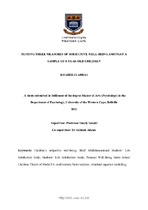Testing three measures of subjective well-being amongst a sample of 8-year-old children
Abstract
Research on children’s well-being has increased over the past decade, largely driven by advancements in children’s rights legislation and the emergence of innovative theoretical and epistemological frameworks. While there has been a notable increase in empirical research on children’s objective standards of living, less data has been available in relation to their subjective perceptions and evaluations of their life. The measurement of children’s subjective well-being (SWB) has been a particular focus of empirical research especially as it relates to the development of valid scales for use with children across age groups and contexts. An area of concern is the lack of psychometrically sound measurement instruments for use with younger children and especially in low-to-middle income contexts.

